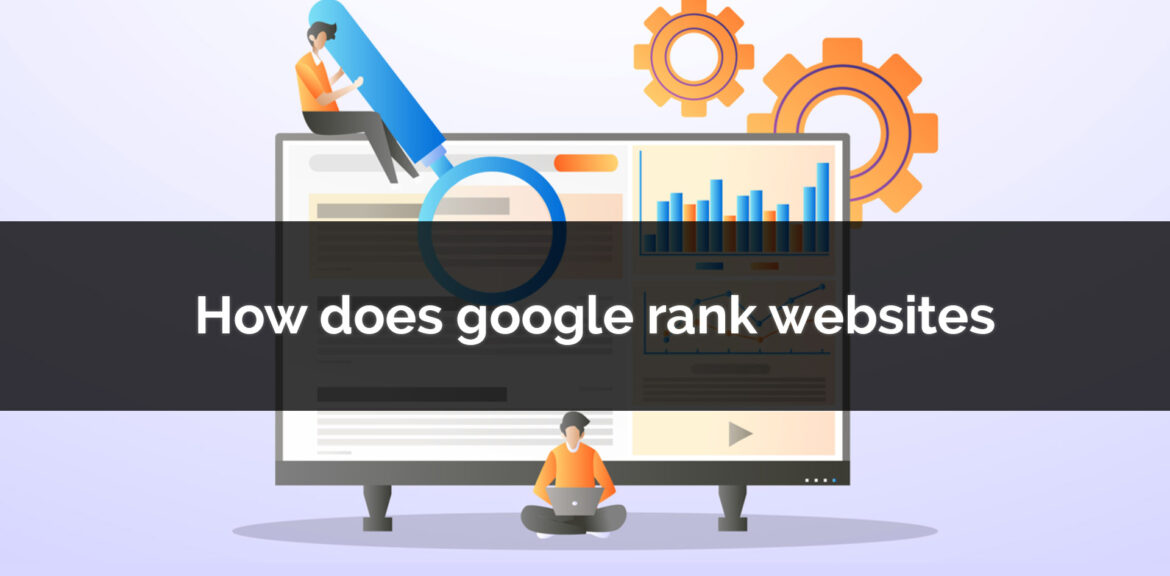How does google rank websites
Ranking factors and tips
Google looks for two factors when ranking your site: authority and relevance. Based on the results of the google algorithm and information obtained by search engines, Google will rank websites. The order in which these websites appear on search result pages reflects their ranking. The methods of google websites ranking aren’t always apparent or simple, there are many strategies and techniques inside the skeletal framework of an SEO strategy to help you climb that rank ladder. Maintain relevance in your content, continue to establish your linking, incorporate relevant keywords and phrases, and assert your site authority. In a moment, you’ll be on your way to the top.
Factors that show how Google ranks websites.
The 4 best google ranking factors
There are several site specificities Google relies on to put your organization in its place, with over 200 factors that determine your rating in the Google algorithm. The fight to get to the top of the page is difficult, and it takes a long time. Fortunately, we’ve studied Google’s algorithm and ranking strategy extensively. Following are the 4 most important factors that how google website ranking are:
- Contents’ Quality
- Optimization/ Meta Information
- High Quality BackLink
- Technical SEO
- Contents’ Quality.
Content is still king
Material has long been one of the most important Google ranking factors, but we’ve witnessed a trend away from keyword-focused content in favor of more relevant content presented in a natural and real tone in recent years. The days of successful keyword stuffing are long gone, and today’s algorithms are capable of distinguishing between excellent content and attempts to cheat the system.
In order to attract traffic and surpass the competition, well-written and thematically relevant content that is optimized for search engines is essential. Content optimization is a big issue with a lot of moving parts, but it’s critical if you want to rank well in search results.
So, what does it take to create relevant content? The short answer is: everything. Whether your website’s goal is to inform or promote a product or service, if the content is badly written, the goal is lost readers will simply not grasp what you’re trying to say. You should also ask; Is this page comprehensive enough to provide all of the details and information that a potential visitor might seek? Google is pretty adept at analyzing pages and determining whether or not they satisfy the searcher’s goal.
The material on your website’s pages should be rich in information, with straightforward and easy to read words. You should also use headings and graphics to separate up the sections.
- Optimization/ Meta Information
Meta tag optimization
Basic metadata-a set of data that describes and gives information about other data, meta title, meta description, and onsite H1 and H2 tags on each page of an optimized website assist influence how your site ranks. Meta description tags, on the other hand, are vital for getting people to click through from SERPs(Search Engine Results Pages), and those clicks do have an impact on rankings. These short paragraphs allow you to advertise content to searches while also allowing users to determine whether the content is relevant and offers the information they’re looking for.
We’ve observed that meta titles and descriptions are still important when it comes to ranking boosts, and that changing the description can alter the position you hold for a term on Google, demonstrating that meta descriptions are still vital when it comes to optimizing your web pages.
- High Quality BackLink
Having a high quality backlink help you to rank your website on top
Backlinks, also known as inbound links, are links that are directed to your website. Your website’s popularity or importance is determined by the amount of backlinks it has. Backlinks are vital for SEO because Google gives greater credit to websites with a large number of high-quality backlinks, and considers those websites to be more relevant than others in their search query results pages.
Backlinks are still a significant Google website ranking component, but Google has improved its ability to distinguish between good and bad links over time. The more links your website has, the higher its score will be, but only if the links are from high-quality, authoritative domains. Link building, outreach, guest blogging, and digital PR are just a few strategies for gaining high-quality links for your website. This is how Google ranks websites on top.
- Technical SEO
Technical SEO to improve your website ranking
Many technical SEO criteria also play a significant impact in google website’s ranking. Regular technical audits verify that your website complies with Google’s requirements and that it can be indexed and ranked for relevant keywords.
The structure of your website must be able to handle as it grows over time. Pages should ideally not be buried too deep within the site, which necessitates a horizontal design. This helps search engines to crawl, cache, and index content on a regular basis. Canonicalisation, website cannibalism, redirections, page performance, and HTML structure are only a few of the major technical considerations.
Conclusion
There will be a significant impact on SEO marketing methods. Google’s recent improvements have paved the way for sites with high-quality content that adds actual value to users. Google is also improving its ability to track how users interact with your content. To rank a website on the top of search engines it is important to have good content.
What is affiliate marketing? Click the link to find out.




